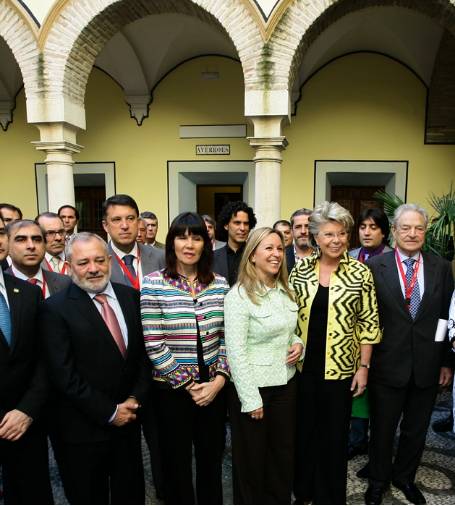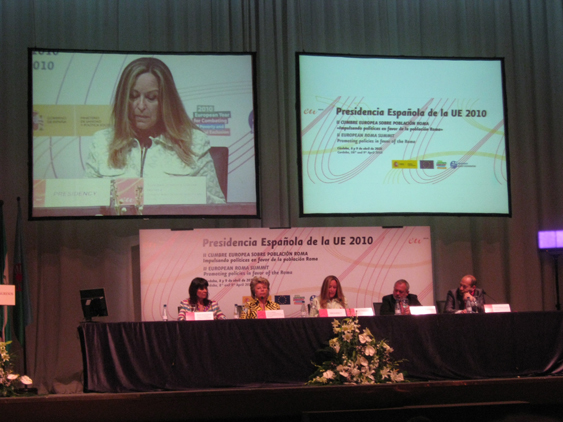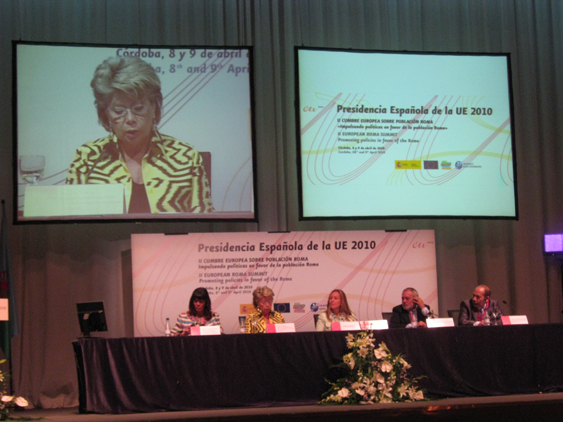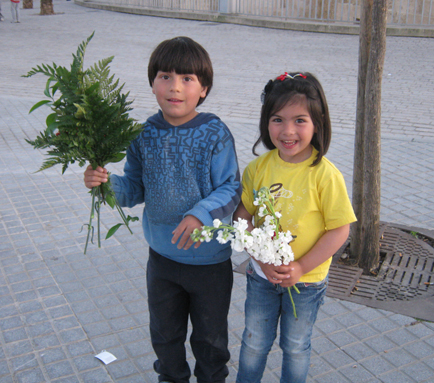11.04.2010Second EU Roma Summit
 The Second EU Roma Summit took place on 8th and 9th April in the city of
The Second EU Roma Summit took place on 8th and 9th April in the city of
In the city of the philosopher Averroes, who lived in the 12th century and taught that all people shared a common sacred immortal soul, participants discussed how to make sure that Europe immortal sacred principles of equality, solidarity and social inclusion would reach Roma and become common fate of all Europeans.
The focus of the Spanish presidency of the European Union will be on four of the ten basic principles of European Roma Integration: explicit, but not excluding targeting, awareness of gender equality, use of community instruments, and inclusion of civil society. Therefore, these were the main topics of the four working groups following the plenary sessions. The meeting and the following discussions probably will be discussed in different ways in the forthcoming months. One thing is sure: there is sufficient reason to claim that it will affect the process of Roma integration. Below one can find information about the main speeches and a brief analysis.
The Communication from the European Commission: A day before the
Mobilization of the Structural Funds (including the European Social Fund) representing nearly half the EU budget to support Roma inclusion;
Taking into consideration Roma issues in all relevant areas of implementation of policies at national and European levels: from employment to urban planning and health to EU enlargement;
Mobilising the potential of Roma communities to support the inclusive growth as part of the "Europe 2020" strategy.
Although written in the usual for such a document diplomatic language the Communication demonstrates increased political commitment by the Commission to engage in Roma inclusion which creates a better basis for the Summit.
Key speeches:
 The Spanish Minister of Health and Social Policy Trinidad Jimenez said at the opening of the forum that Roma culture is one of the richest cultures and Roma rights must be guaranteed. Jimenez noted that social discrimination against Roma could be addressed only through coordinated efforts between the EU institutions and Member States. She urged Roma to participate actively in the preparation of projects and programs since the initiative of the European and national institutions will not be effective without Roma participation. The Spanish Prime Minister expressed also satisfaction with the communication of the Commission which urges the Member States to use EU funds to ensure social and economic integration of Roma. It identifies education and employment as key priorities and highlights that the extremely high percentage of Roma teenagers drop-outs should be limited. Moreover, she added that special measures were needed to ensure the employment of Romani women, as only 30% of them worked outside their homes.
The Spanish Minister of Health and Social Policy Trinidad Jimenez said at the opening of the forum that Roma culture is one of the richest cultures and Roma rights must be guaranteed. Jimenez noted that social discrimination against Roma could be addressed only through coordinated efforts between the EU institutions and Member States. She urged Roma to participate actively in the preparation of projects and programs since the initiative of the European and national institutions will not be effective without Roma participation. The Spanish Prime Minister expressed also satisfaction with the communication of the Commission which urges the Member States to use EU funds to ensure social and economic integration of Roma. It identifies education and employment as key priorities and highlights that the extremely high percentage of Roma teenagers drop-outs should be limited. Moreover, she added that special measures were needed to ensure the employment of Romani women, as only 30% of them worked outside their homes.
"Social inclusion of Roma remains one of the top issues in the agenda of the European Commission", the Vice-President and Commissioner for Justice, Fundamental Rights and Citizenship Viviane Reding stressed in her speech at the opening of the Summit. For the past 19 months from the first summit we all have worked to move from recognition and analyzing problems to solving them. The role of the European Commission in this process is to ensure the necessary European legislation and EU funds, and be an effective coordinator and facilitator in the efforts of various national governments, said Ms Reding. She pointed out that this was already assured: there has been a good European anti-discrimination legislation and access to Structural funds for initiatives targeting Roma. There is also a good experience in the development of programs which main focus are Roma. "So I do not believe that we should waste efforts to develop special laws for special funds and Roma. Existing legislation and funds are available to address the challenges and we must use them more effectively. " Reding clearly said.
Commission", the Vice-President and Commissioner for Justice, Fundamental Rights and Citizenship Viviane Reding stressed in her speech at the opening of the Summit. For the past 19 months from the first summit we all have worked to move from recognition and analyzing problems to solving them. The role of the European Commission in this process is to ensure the necessary European legislation and EU funds, and be an effective coordinator and facilitator in the efforts of various national governments, said Ms Reding. She pointed out that this was already assured: there has been a good European anti-discrimination legislation and access to Structural funds for initiatives targeting Roma. There is also a good experience in the development of programs which main focus are Roma. "So I do not believe that we should waste efforts to develop special laws for special funds and Roma. Existing legislation and funds are available to address the challenges and we must use them more effectively. " Reding clearly said.
A symbolic idea in her speech was the placement of Roma integration into the wider perspective of the implementation of the Strategy2020. "We must ensure that it (Strategy 2020) will work for Roma as it works for everyone in Europe, the Vice-President of the European Commission stressed. In this respect, the Commission will use two instruments. The first one is the European Roma Platform. A medium-term work program of the Platform should be elaborated soon: an idea launched by the Spanish EU presidency. Other means are the Structural Funds and the Commission will work more effectively for their commitment to Roma inclusion. "We can not afford another generation of Roma to grow without being able to use their potential", Viviane Reding pointed out.
The speach of George Soros, founder of the Open Society Institute was one of the most anticipated and can definitely be called "a sign": filled with compelling findings, brilliant argumentation and clear policy recommendations that would definitely draw the future frames of the development of the efforts for Roma integration. "The majority in the countries where many Roma live is hostile to them ... Roma and the majority are locked in a vicious circle in which reality and stereotypes feed off each other in an interconnected manner. This vicious circle must be broken - G. Soros underlined. And the key to this is education, a new generation of educated Roma who have successfully integrated in the macrosociety and at the same time have not been assimilated and have preserved the Roma identity. Soros pointed many of the things that the Open Society Institute has made to bring this key to the lock. He clearly asked the European Union to engage in decisive turning the key and unlocking the door of Roma integration. Welcoming the European Commission's Communication of April 7, he stressed the need not only to bind the European funds with Roma integration but also to simplify application procedures and speed up the payments of funds which can effectively reach Roma. Soros called for establishing a long-term European Roma strategy based on the principles proven to be successful in the activities of the Roma Education Fund and the Decade of Roma Inclusion. He finished with four recommendations: to give priority to education (starting with the pre-school education) as a tool for social inclusion within Strategy 2020; the principle “explicite but not exclusive targeting" adopted by the European Council in June 2009 and already applied in the field of housing to be extended in education, health and employment; the European Union to use its leverage to influence Member States to strengthen their political commitment to Roma integration, the Union to ensure that new candidate countries will be accepted only if they ensure equal rights to their citizens.
"Our support for Roma Inclusion should be explicit, but not excluding, and must ensure that all Roma can benefit from their rights and equal opportunities, said in his concluding remarks Laszlo Andor, Commissioner for Employment, Equal Opportunities and anti-discrimination ... This should be done together with the Roma community and not for them, definitely - not despite them. "As an example in this direction Commissioner Andor pointed out that the Roma community should not only participate but also be co-owners of all-European programs in order Roma inclusion to be able to happen in every village and town. It is also needed any reasonable initiative in the field of Roma integration to be co-financed by the Structural Funds through which key problems of Roma can be addressed.
Commissioner Andor underlined that the European Commission will not withdraw its commitment to the integration of Roma. The Commission will continue to initiate EU legislation, to coordinate national policies and to promote dialogue between civil society and governments to ensure that Roma issues are adequately addressed in all policy areas. We will work to make their policies more effective - the Structural Funds, the OMC, Program 2020 and so on, Commissioner Andor stressed firmly. In particular, the Commission will propose to Member States various successful models of integration which they will choose according to their national context.
"The inclusion of Roma is a duty and a necessity. It will not only enrich our cultural society but also create economic and human wealth."- with these words Commissioner Andor summarized the discussions and closed the forum.
"Explicit, but not exclusive targeting”: The second principle of the conclusions of the EU Council from June 2009 has been the subject of one of the busiest round tables following the plenary session. Its moderator was Jan Jarab (current representative of the UN Commissioner for Human Rights and former advisor to former Commissioner for Employment Vl. Shridla) and participants - Thomas Bender (Director of the European Social Fund), Tobias Linden (Roma Education Fund) Ilie Dinka (National Agency for Roma - Romania), Isidro Rodriguez (Foundation "Secretariat of the Gypsies (Gitanos)" - Spain). Participants agreed on the view that targeted action for Roma integration were necessary to overcome the existing segregation and only in this way Roma could benefit from their rights as European citizens. Thomas Bender refered to the example of Bulgarian in the preparation of the Human Resources Development Operational Programme. "Initially the Bulgarian government was not willing to allow targeted action - Bender said - then we (DG Employment of the European Commission) and Roma organizations in Bulgaria - they are here and will confirm that - proposed many arguments and today the Bulgarian OP has 6 measures targeting Roma; there is a special chapter "Fields of Action on Roma", Roma organizations are represented in the Monitoring Committee of the program and actively participate. "
Statements were accompanied by comments and questions. Deyan Kolev (Center «Amalipe" and representative of the Roma organizations in the Monitoring Committee of the OP Human Resources Development ") pointed specific numbers of program implementation in 2007-2009, stressing that only calls for projects targeting Roma could ensure that the funds would reach Roma and would help their integration. He called the next programming period the ESF to set an indicative budget for targeted operations directed to Roma (at least 5%) and Roma organizations to be included as a specific beneficiary (the status that have trade unions, employers and other instututions) which will enable them to achieve greater interventions.
Using of Community Instruments: Working Group 3 discussed the seventh principle of the ten basic principles for Roma integration. Local practices in the use of pre-accession funds and structural funds in Serbia, Sweden, Hungary and Ireland were presented. In addition, the main findings of the World Bank report "The economic costs of Roma exclusion.” The study is to be finalized in June. It clearly shows that from a purely economic perspective the costs invested in measures to integrate Roma will be regained and is incomparably less than the costs a national governments should pay if the problems of vulnerable groups were maintained and deepened. By World Bank estimates the lower limit of estimates of annual productivity losses in the continuing exclusion of Roma is 231 million for Serbia, 367 million for the Czech Republic, 526 million for Bulgaria and 887 million for Romania. At the same time the survey shows that better education for Roma will bring much higher revenue. Compared to Roma with primary education, those with secondary education can earn up to 83% higher income in Bulgaria and 144 percent higher income in Romania. In this regard Teodora Krumova from Center Amalipe offered similar calculations to be made about the costs of exclusion of Roma women. The proposal has received great interest from the World Bank representatives who said that they would surely include the gender aspect in the study. Moreover, they promised to consult and receive feedback from the Roma organizations in the four countries before the final completion of the report.
structural funds in Serbia, Sweden, Hungary and Ireland were presented. In addition, the main findings of the World Bank report "The economic costs of Roma exclusion.” The study is to be finalized in June. It clearly shows that from a purely economic perspective the costs invested in measures to integrate Roma will be regained and is incomparably less than the costs a national governments should pay if the problems of vulnerable groups were maintained and deepened. By World Bank estimates the lower limit of estimates of annual productivity losses in the continuing exclusion of Roma is 231 million for Serbia, 367 million for the Czech Republic, 526 million for Bulgaria and 887 million for Romania. At the same time the survey shows that better education for Roma will bring much higher revenue. Compared to Roma with primary education, those with secondary education can earn up to 83% higher income in Bulgaria and 144 percent higher income in Romania. In this regard Teodora Krumova from Center Amalipe offered similar calculations to be made about the costs of exclusion of Roma women. The proposal has received great interest from the World Bank representatives who said that they would surely include the gender aspect in the study. Moreover, they promised to consult and receive feedback from the Roma organizations in the four countries before the final completion of the report.
Cordoba Declaration, 9.04.2010
 The summit ended with a joint statement by the so-called “triple presidency of the EU (including the current Presidency of Spain and the forthcoming Belgium and Hungary). The trio expresses its understanding that it is the time to give a boost to the Roma dossier in order to achieve substantial improvement in the social and economic integration of the Roma in Europe. Hence, it is necessary to ensure that current policies and instruments are fully developed and made work efficiently from a medium-term perspective by:
The summit ended with a joint statement by the so-called “triple presidency of the EU (including the current Presidency of Spain and the forthcoming Belgium and Hungary). The trio expresses its understanding that it is the time to give a boost to the Roma dossier in order to achieve substantial improvement in the social and economic integration of the Roma in Europe. Hence, it is necessary to ensure that current policies and instruments are fully developed and made work efficiently from a medium-term perspective by:
- mainstreaming of Roma issues in European and national policies in order to that European strategies and instruments include specific actions favouring socio-economic inclusion of the Roma. This mainstreaming should be guaranteed in areas such as fundamental rights, gender approach, personal safety and protection against discrimination, poverty and social exclusion, regional cohesion, economic development and access to education, housing, health, employment, social services, justice, sports and culture.
- Improve the design of a road map of the Integrated Platform on Roma Inclusion which establishes a framework for medium-term action, as well as for objectives and results to be achieved; prioritising the key issues to be addressed; and strengthening horizontal cooperation among Member States and civil society, with the adequate support and boost of the Commission for the preparation of the meetings and activities.
- Ensuring the use of EU Structural Funds for Roma integration. The Declaration explicitly welcomed the recent additions to the art. 7 of the Rules of the European Regional Development Fund, which require a minimum of 3% of the fund to be used to improve the living conditions of marginalized groups and overcoming segregation in urban and rural areas. The Declaration clearly provides such a requirement, ensuring equal access of Roma to EU funds to be applied by the European Social Fund and the Fund for Rural Development. In addition, the document requires the simplification of procedures for absorption.
The declaration ends with a commitment to summarize the findings of the second summit and apply them in the policies of this and next two EU presidencies.
Commemoration ceremony of April 8: Participants in the








